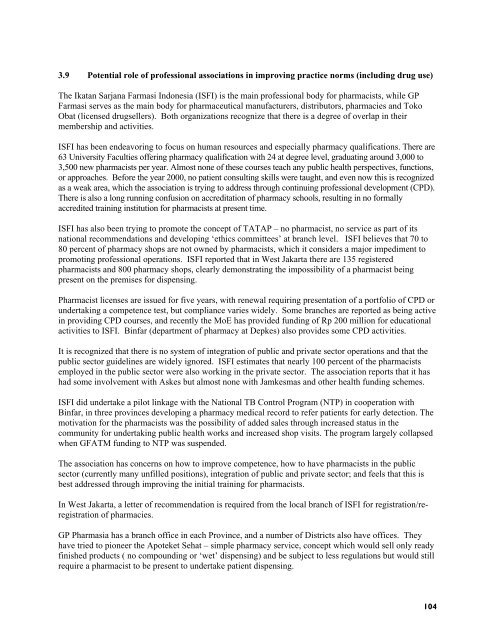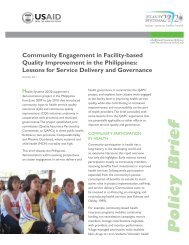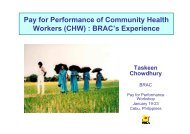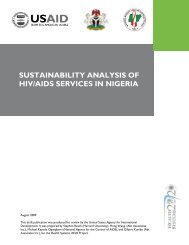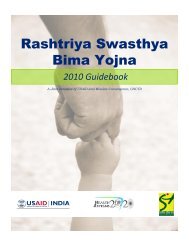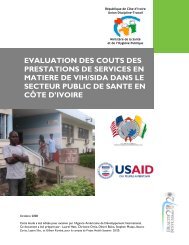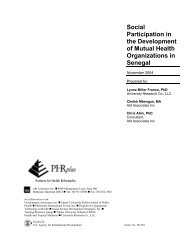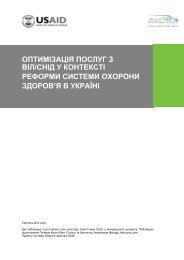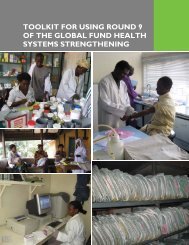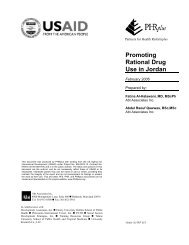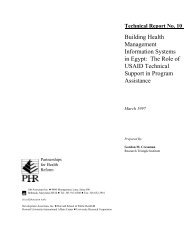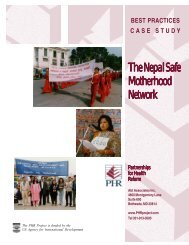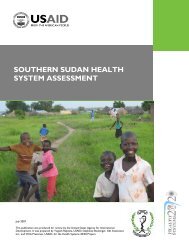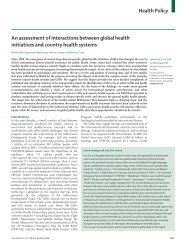PRIVATE SECTOR HEALTH CARE IN INDONESIA - Health Systems ...
PRIVATE SECTOR HEALTH CARE IN INDONESIA - Health Systems ...
PRIVATE SECTOR HEALTH CARE IN INDONESIA - Health Systems ...
- No tags were found...
You also want an ePaper? Increase the reach of your titles
YUMPU automatically turns print PDFs into web optimized ePapers that Google loves.
3.9 Potential role of professional associations in improving practice norms (including drug use)The Ikatan Sarjana Farmasi Indonesia (ISFI) is the main professional body for pharmacists, while GPFarmasi serves as the main body for pharmaceutical manufacturers, distributors, pharmacies and TokoObat (licensed drugsellers). Both organizations recognize that there is a degree of overlap in theirmembership and activities.ISFI has been endeavoring to focus on human resources and especially pharmacy qualifications. There are63 University Faculties offering pharmacy qualification with 24 at degree level, graduating around 3,000 to3,500 new pharmacists per year. Almost none of these courses teach any public health perspectives, functions,or approaches. Before the year 2000, no patient consulting skills were taught, and even now this is recognizedas a weak area, which the association is trying to address through continuing professional development (CPD).There is also a long running confusion on accreditation of pharmacy schools, resulting in no formallyaccredited training institution for pharmacists at present time.ISFI has also been trying to promote the concept of TATAP – no pharmacist, no service as part of itsnational recommendations and developing ‘ethics committees’ at branch level. ISFI believes that 70 to80 percent of pharmacy shops are not owned by pharmacists, which it considers a major impediment topromoting professional operations. ISFI reported that in West Jakarta there are 135 registeredpharmacists and 800 pharmacy shops, clearly demonstrating the impossibility of a pharmacist beingpresent on the premises for dispensing.Pharmacist licenses are issued for five years, with renewal requiring presentation of a portfolio of CPD orundertaking a competence test, but compliance varies widely. Some branches are reported as being activein providing CPD courses, and recently the MoE has provided funding of Rp 200 million for educationalactivities to ISFI. Binfar (department of pharmacy at Depkes) also provides some CPD activities.It is recognized that there is no system of integration of public and private sector operations and that thepublic sector guidelines are widely ignored. ISFI estimates that nearly 100 percent of the pharmacistsemployed in the public sector were also working in the private sector. The association reports that it hashad some involvement with Askes but almost none with Jamkesmas and other health funding schemes.ISFI did undertake a pilot linkage with the National TB Control Program (NTP) in cooperation withBinfar, in three provinces developing a pharmacy medical record to refer patients for early detection. Themotivation for the pharmacists was the possibility of added sales through increased status in thecommunity for undertaking public health works and increased shop visits. The program largely collapsedwhen GFATM funding to NTP was suspended.The association has concerns on how to improve competence, how to have pharmacists in the publicsector (currently many unfilled positions), integration of public and private sector; and feels that this isbest addressed through improving the initial training for pharmacists.In West Jakarta, a letter of recommendation is required from the local branch of ISFI for registration/reregistrationof pharmacies.GP Pharmasia has a branch office in each Province, and a number of Districts also have offices. Theyhave tried to pioneer the Apoteket Sehat – simple pharmacy service, concept which would sell only readyfinished products ( no compounding or ‘wet’ dispensing) and be subject to less regulations but would stillrequire a pharmacist to be present to undertake patient dispensing.104


